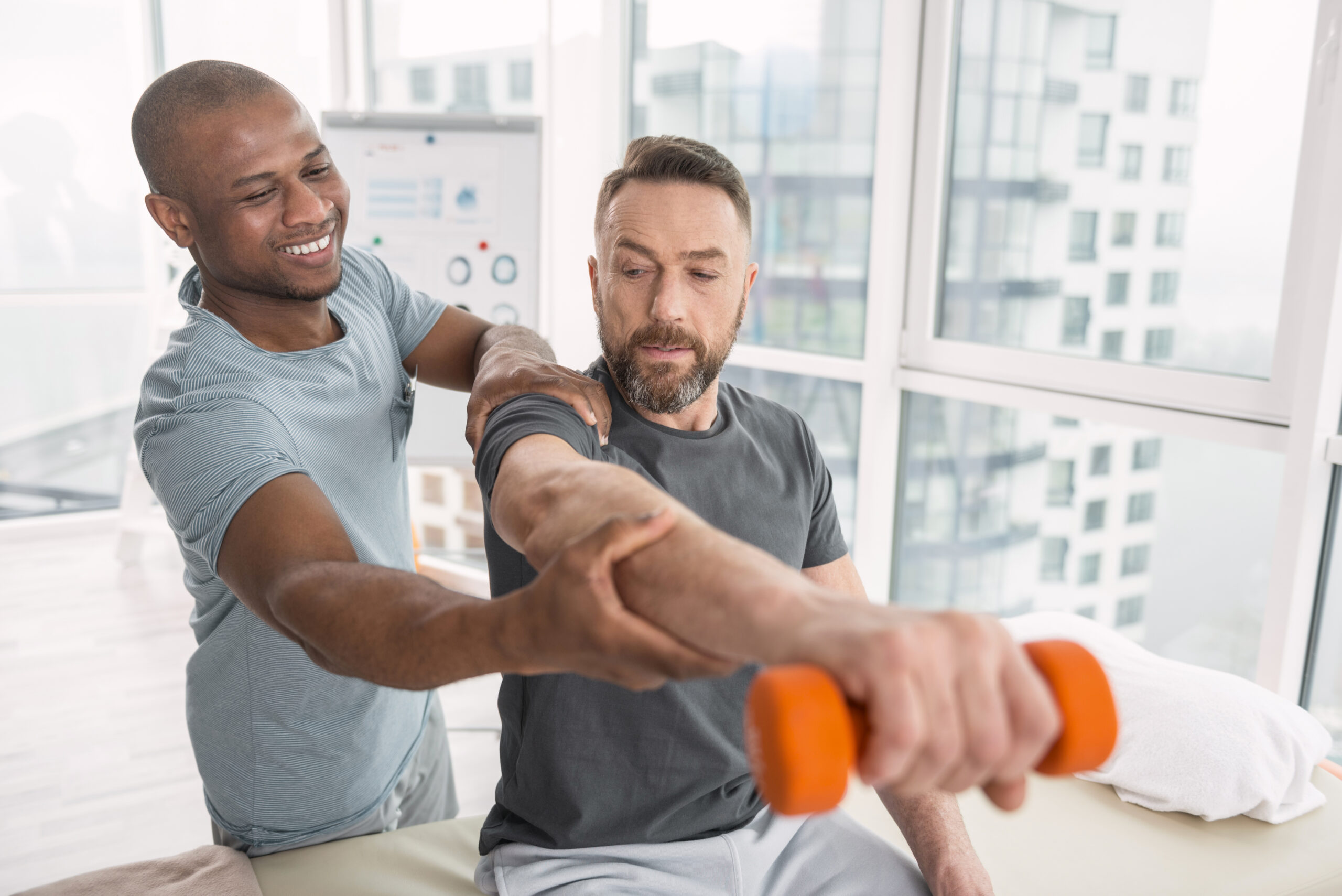Recuperation Redefined: Your Resource for Orthopedics and Physical Therapy Roanoke
Recuperation Redefined: Your Resource for Orthopedics and Physical Therapy Roanoke
Blog Article
Comprehending the Duty of Physical Therapists in Sports Medication
Comprehending the duty of physical therapists in sporting activities medicine is crucial for athletes and medical care experts alike. Physiotherapists play an important function in evaluating professional athletes' conditions and injuries, establishing personalized therapy strategies, and executing rehab strategies. Their competence expands beyond injury healing, as they also focus on improving efficiency and protecting against future injuries. Collaborating with health care experts and coaches, physical specialists give extensive care to professional athletes, guaranteeing their total health and optimum performance. With their considerable understanding and skills, physiotherapists are essential members of the sports medication team, functioning towards the typical objective of maintaining professional athletes healthy and balanced and aiding them reach their complete possibility. This write-up intends to clarify the vital role that physiotherapists play in sports medicine, highlighting their contributions to the field.
Examining Athlete's Injuries and Issues
Physical therapists in sports medicine play a critical function in reviewing athletes' injuries and problems. The capability to properly evaluate a professional athlete's injury is vital in figuring out the appropriate training course of treatment and rehab.
Throughout the assessment, physical specialists collect important info such as the athlete's clinical history, previous injuries, and present signs and symptoms. They also carry out a thorough physical exam, analyzing aspects such as range of activity, toughness, versatility, and security. Unique analysis examinations and imaging might likewise be made use of to more evaluate the injury or condition.
By conducting this extensive assessment, physical specialists have the ability to accurately detect the injury and develop a personalized treatment plan. This may include therapeutic exercises, manual therapy techniques, and methods such as warmth or cool treatment. Furthermore, physical specialists give education and learning and advice on correct strategies for protecting against future injuries, in addition to approaches for optimizing performance and decreasing the threat of re-injury.
Developing Individualized Therapy Plans
Physiotherapists in sports medicine develop tailored therapy strategies based on their comprehensive evaluation of a professional athlete's injuries and problems. This process involves a complete understanding of the athlete's case history, checkup, and diagnostic tests. By collecting this details, the physiotherapist can determine the underlying root causes of the injury or problem and identify one of the most proper course of therapy.
The customized treatment strategy aims to address the details demands of the professional athlete and promote ideal healing. It might include a mix of restorative workouts, hands-on treatment strategies, modalities such as warm or cool therapy, and education on injury avoidance. The physiotherapist will certainly likewise think about the professional athlete's goals, sport-specific needs, and timeline for go back to play when establishing the therapy plan.

Implementing Rehab Strategies
The application of recovery methods plays a pivotal duty in the treatment procedure for professional athletes in sports medication. These techniques are created to help athletes recoup from injuries, improve their performance, and protect against more injury. Physical therapists, as specialists in movement and function, are liable for executing these methods and leading athletes through their rehab trip.
One of the key elements of applying recovery techniques is the evaluation of the professional athlete's problem. physical therapist Roanoke. Physiotherapists evaluate the athlete's injury or condition, taking into consideration variables such as the severity of the injury, the athlete's goals, and their current level of fitness. Based upon this analysis, the specialist develops an individualized treatment plan that includes specific rehab methods
Rehab methods can consist of a range of interventions such as restorative my response exercises, hands-on therapy, techniques (e.g., warm, cool, electrical stimulation), and functional training. These techniques are customized to resolve the professional athlete's specific demands and goals, intending to bring back ideal function, decrease pain, and improve performance.
Throughout the rehab procedure, physical specialists carefully keep an eye on the athlete's progression and make any kind of needed modifications to the treatment strategy. They additionally supply education and guidance to the professional athlete on correct type, injury prevention strategies, and self-care strategies.
Enhancing Efficiency and Preventing Injuries
An essential facet of the physiotherapist's role in sporting activities medication is enhancing efficiency and stopping injuries through targeted treatments. Physical specialists play a vital function in optimizing professional athletes' performance and reducing the danger of injuries by employing numerous techniques and techniques.
To enhance performance, physical therapists work closely with professional athletes to establish customized exercise programs that concentrate on boosting stamina, endurance, versatility, and balance. These programs are created to deal with certain areas of weak point or constraint, allowing professional athletes to reach their full potential (physical therapist Roanoke). Furthermore, physiotherapists may employ techniques such as manual therapy, consisting of joint mobilization and soft cells mobilization, to enhance athletes' movement patterns and boost general performance
In terms of injury avoidance, physiotherapists utilize their understanding of biomechanics and activity evaluation to recognize possible danger elements that might incline professional athletes to injuries. They then design targeted interventions, such as restorative exercises and proprioceptive training, to address these threat elements and lower the probability of injuries. Physical specialists inform professional athletes on proper workout and cool-down techniques, proper footwear, and injury avoidance strategies, equipping them to take an energetic role in stopping injuries.

Teaming Up With Health Care Professionals and Coaches
Partnership with healthcare specialists and trainers is important for physiotherapists in enhancing athlete performance and protecting against injuries in the field of sporting activities medicine. Physical specialists play a vital role in the multidisciplinary group that supports professional athletes, and efficient collaboration with various other professionals is crucial for delivering thorough care.
When collaborating with health care professionals, physical specialists work together carefully with medical professionals, orthopedic specialists, and sporting activities medicine professionals. This collaboration enables much better treatment, evaluation, and medical diagnosis planning for athletes. By sharing their experience and understanding, physical specialists can contribute useful understandings and perspectives to the team, ensuring the very best possible results for professional athletes.
Additionally, partnership with instructors is vital for physiotherapists to make and implement effective training useful reference and conditioning programs. Trainers offer useful details regarding the details needs and objectives of the sporting activity, as well as the athlete's training schedule and performance expectations. By interacting, physical specialists and instructors can create customized programs that resolve the professional athlete's individual needs and enhance their efficiency while minimizing the danger of injury.
Moreover, partnership with health care experts and trainers prolongs beyond the treatment and training stage. Physical specialists often function closely with these experts in creating injury avoidance approaches and methods. By sharing their proficiency and knowledge, they can contribute to the growth of evidence-based methods that intend to minimize the incident of injuries and make best use of professional athlete performance.
Conclusion
To conclude, physiotherapists play a crucial duty in sports medication by examining athletes' problems and injuries, developing tailored therapy plans, executing rehabilitation strategies, improving efficiency, and stopping injuries. They also team up with health care professionals and instructors to make certain detailed look after professional athletes. Their knowledge and knowledge contribute significantly to the total health and health of athletes in the field of sporting activities medicine.
Physical specialists play a crucial role in examining professional athletes' problems and see it here injuries, developing customized treatment strategies, and implementing rehab strategies. Physical therapists examine the professional athlete's injury or condition, taking into account aspects such as the severity of the injury, the athlete's objectives, and their existing level of physical fitness - Roanoke physical therapy.In terms of injury prevention, physical therapists use their expertise of biomechanics and motion evaluation to identify potential danger variables that might incline athletes to injuries. Physical therapists inform athletes on proper warm-up and cool-down methods, proper shoes, and injury avoidance methods, equipping them to take an energetic duty in preventing injuries
In conclusion, physical therapists play an important function in sports medication by reviewing athletes' conditions and injuries, developing customized treatment plans, executing rehabilitation techniques, enhancing performance, and stopping injuries.
Report this page